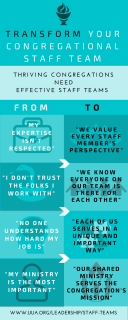Congregational Staff Teams
By Unitarian Universalist Ministers Association (UUMA), Liberal Religious Educators Association, Association for Unitarian Universalist Music Ministries (AUUMM)

Ministry Is Meant to Be Shared
The most vital and thriving congregations practice Shared Ministry. This includes an intention to match personal gifts with opportunities to serve, in covenantal relationship, all in service to the mission and vision of the congregation. The health and vitality of the congregation depends on the health and vitality of its minister(s), religious educator(s), music professional(s), administrative professional(s), membership professional(s) and other staff.
This library of resources was originally compiled in 2017 by a Shared Ministry Resource Team, comprised of members of LREDA, UUMA, UUMN, with input from the Ministries and Faith Development and Congregational Life offices of the UUA.
From: “My expertise isn’t respected”. To: “We value every staff member’s perspective”.
From: “I don’t trust the folks I work with”. To: “We know everyone on our team is there for each other”.
From: “No one understands how hard my job is”. To: “Each of us serves in a unique and important way”.
From: “My ministry is the most important”. To: “Our shared ministry serves the congregation’s mission”.

Staff Team Self-Assessment
The most vital and thriving congregations practice shared ministry. Strong staff teams add to the health and vitality of our congregations. This self- assessment tool for staff teams was inspired by Susan Beaumont’s30 Markers of Staff Team Health and Patrick Lencioni’s5 Dysfunctions of a Team, as well as our shared commitments to multicultural anti-oppressive congregations. Resources for continued learning and development are included when available. This tool is designed to foster open and respectful conversations among staff team members, enabling effective, engaged, and compassionate staff team relationships. All religious professionals are invited to bring this assessment tool to their staff teams, as a means of personal and shared reflection and learning.
Have Your Staff Team Take this Self-Assessment (Word)

Collegial Covenanting
- Administration as Leadership (PDF) (Renaissance module)
Ellenwood, Pat, 2013
Particularly Session 3: Partners in Faith Development, which explores staff covenants and supervision, and Session 2: The Religious Educator in the Congregation, which talks about healthy communication.

Collaborative Leadership/Staff Team Leadership
- 30 Markers of Staff Team Health
Susan Beaumont, NACBA, 2011
This article points to a simple exercise to do with your staff – look at the list together; get a quick collective sense of what you’re doing well and what you should work on. Also lifts up polarity of collaboration and accountability. - Is Our Staff a Team?
John Wimberly, Congregational Consulting Group, January, 2019
Almost every congregational staff calls itself a team. But are they really teams? In many, perhaps most cases, staffs have hierarchical leadership with staff members working in “silos.” When this is the case, they are not teams. What are some key characteristics that reveal whether or not a staff is a team? - Susan Beaumont and Associates, LLC
Susan Beaumont - previously with the Alban Institute - has a consulting firm that advises on topics of relevance to shared ministry, such as creating healthy staff teams, leading when you are not in charge, supervising staff, adaptive leadership and transitions. Monthly webinars, live events, and a blog can be found at her website. - Collegiality: Being a Good Colleague (YouTube)
Central East Region
Facilitated by Pat Infante. Congregations with multi player staff teams must work intentionally to create strong, collegial partnerships but doing so can introduce tension and anxiety into the congregational system. We’ll talk about covenant, collegiality, creative tension, and conflict – all forces that can be leveraged to build better staff relationships. - Administration as Leadership (PDF) (Renaissance module)
Ellenwood, Pat, 2013
Particularly Session 3: Partners in Faith Development, which explores staff covenants and supervision, and Session 2: The Religious Educator in the Congregation, which talks about healthy communication. - Rivals or a Team? Clergy-Musician Relationships in the Twenty-First Century
Gunter, Eileen, MorningStar Music Publishers, 2012
Explores the importance of teamwork in the Christian church, identifying ways in which musicians and clergy can exercise their separate roles effectively, and suggesting strategies for building supportive relationships. Includes sections on conflict, reasons musicians leave a church, and approaches for transition when the situation just does not work any longer. - The Advantage: Why Organizational Health Trumps Everything Else in Business
Lencioni, Patrick, JosseyBass, 2012
Build a cohesive team, be clear about purpose and values, prioritize. - The Five Dysfunctions of a Team: A Leadership Fable
Lencioni, Patrick, JosseyBass, 2002
Entertaining book with 5 simple, successive takeaways. Trust is paramount. Healthy conflict is vital. - The Tablegroup
Patrick Lencioni website with lots of info on Five Dysfunctions and The Advantage . - Sticky Teams: Keeping Your Leadership Team and Staff on the Same Page
Osborne, Larry, Zondervan, 2010
Strategies for keeping staff aligned and avoiding pitfalls. - Covenants of Leadership Behavior
Rendle, Gil: Alban Institute, 2012
How Covenantal Leadership helps congregations and all staff lead a better, fast, and more communal process. - Harvest the Power (Tapestry of Faith)
Tittle, Gail and Matt and ForsythVail, Gail.
Though written for lay leaders, portions could be adapted for professional leaders. The 12 workshops include discussions of such issues as power and authority, adaptive leadership, and selfcare. - Fulfilling the Call: A Model for UU Ministry in the 21st Century
UUA, UUMA, EDC, UUA, 2013
Describes expectations of ministers in 9 broad areas of ministry (duties) at four skill levels. Includes staff leadership as part of “Leads Administration.” - Mobilizing Congregations: How Teams Can Motivate Members and Get Things Done
Wimberly Jr., John W, Rowman & Littlefield, 2015
This is a look at the power teams bring to congregational work. Wimberly demonstrates that younger generations in particular are much happier working in a team, rather than a committee environment. Congregations using teams are able to mobilize members across generations for both short and long term tasks. - Teams and Performance
Wimberly, John, Alban Institute, 2011
This article lifts up the importance of team performance as opposed to overfocusing on the individual. - Gamifying Teamwork
A new game called Mission: Possible helps teams develop solutions to problems while also learning about teamwork, design thinking and innovation. - Star Island RE Week 2015 Collaborative Leadership Audio Program. Exploring themes related to our changing world, the changing nature of church, the critical role of great collaborative teams in navigating these changes, and religious education as a growth strategy, this program features talks and panel discussions with Carey McDonald, Patricia Infante, Starr Austin, Andrea Lerner, Patricia Hart, Cathy Seggel, and Pat Humphries & Sandy O. of Emma’s Revolution, plus a wrap up conversation with Carey McDonald and Peter Bowden.
- Radically Shared Ministry Faith Development Office webinar April 2016. The staff leadership team of Thomas Jefferson Memorial Church UU in Charlottesville, VA shares their experiences as a mutually accountable, collaborative team. Presenters: Leia Durland Jones, Christina Rivera, and Rev. Erik Wikstrom.
- Trainings/Events
- Visit your local Regional Events Calendar for details

Supervisory Relationships
- Church Administration: Programs, Process, Purpose
Bacher , Robert N. and Michael L. CooperWhite, Fortress Press, 2007
Particularly Chapter 9: Ministry Teams: Teeming with Talent - Susan Beaumont and Associates , LLC
Susan Beaumont - previously with the Alban Institute - has a consulting firm that advises on topics of relevance to shared ministry, such as creating healthy staff teams, leading when you are not in charge, supervising staff, adaptive leadership and transitions. Monthly webinars, live events, and a blog can be found at her website. - Supervision and Cultural Differences, by Susan Beaumont. Culturally sensitive supervision requires frequent and ongoing communication. Conversation is the foundation of accountability.
- Administration as Leadership (PDF) (Renaissance module)
Ellenwood, Pat, 2013
Particularly Session 3: Partners in Faith Development, which explores staff covenants and supervision, and Session 2: The Religious Educator in the Congregation, which talks about healthy communication. - Rivals or a Team? Clergy-Musician Relationships in the Twenty-First Century
Gunter, Eileen, MorningStar Music Publishers, 2012
Explores the importance of teamwork in the Christian church, identifying ways in which musicians and clergy can exercise their separate roles effectively, and suggesting strategies for building supportive relationships. Includes sections on conflict, reasons musicians leave a church, and approaches for transition when the situation just does not work any longer. - Powerful Conversations: How High-Impact Leaders Communicate
Harkins, Phil, McGrawHill Education, 1999
How to have conversations that strengthen relationships, promote shared learning, and advance agendas. - Living Our Vision (PDF): The Congregation as a Responsible Employer
Rob Molla et al, UUA General Assembly 2010 workshop
Powerpoint slides. Get off to a good start. All kinds of HR wisdom about recruiting and hiring. - When Moses Meets Aaron: Staffing and Supervision in Large Congregations
- Rendle, Gil, Beaumont, Susan, Alban Institute, 2007.
Note: most content is very relevant to any congregation large enough to have a staff. Great resource for all aspects of staffing, hiring, supervising. - Guide to 360 Reviews – What is a 360? How Do You Administer 360 Feedback?
Vanek, Christian, 2013
Reviews that helps teams look at and evaluate employees from all different perspective of those interacting with them. Meant to provide well-rounded evaluation
Systems Thinking and Adaptive Leadership
- Susan Beaumont and Associates, LLC
Susan Beaumont - previously with the Alban Institute - has a consulting firm that advises on topics of relevance to shared ministry, such as creating healthy staff teams, leading when you are not in charge, supervising staff, adaptive leadership and transitions. Monthly webinars, live events, and a blog can be found at her website. - Conflict 101: Meeting Resistance (YouTube)
Central East Region
Facilitated by Mark Bernstein. The key is how the leader meets and responds to the resistance that is causing the conflict. In this session, we’ll talk about getting trust vs. getting agreement, creating a culture that minimizes conflict, and specific steps for resolving situations causing conflict. - Emotional Intelligence: The Non-Anxious Leader (YouTube)
Facilitated by Mark Bernstein. This class will provide an introduction to emotional intelligence and the five skills required to be at your best as a leader in your congregation. You’ll also have a chance to assess your own level of emotional intelligence. - The Practice of Adaptive Leadership: Tools and Tactics for Changing Your Organization and the World
Heifetz, Ronald A, Grashow, Alexander, Linsky, Marty, Harvard Business Press, 2009
Ministry-transforming concepts and practices! - The Fifth Discipline: The Art and Practice of the Learning Organization
Senge, Peter, Doubleday, 2006 (revised)
Disciplines of a learning organization; the 5 th , systems thinking, integrates the other four. This is a classic that reads as fresh. - Harvest the Power (Tapestry of Faith)
Tittle, Gail and Matt and ForsythVail, Gail.
Though written for lay leaders, portions could be adapted for professional leaders. The 12 workshops include discussions of such issues as power and authority, adaptive leadership, and selfcare. - Mobilizing Congregations: How Teams Can Motivate Members and Get Things Done
- Wimberly Jr., John W, Rowman & Littlefield, 2015
This is a look at the power teams bring to congregational work. Wimberly demonstrates that younger generations in particular are much happier working in a team, rather than a committee environment. Congregations using teams are able to mobilize members across generations for both short and long term tasks.
Transitions
- Susan Beaumont and Associates, LLC
Susan Beaumont - previously with the Alban Institute - has a consulting firm that advises on topics of relevance to shared ministry, such as creating healthy staff teams, leading when you are not in charge, supervising staff, adaptive leadership and transitions. Monthly webinars, live events, and a blog can be found at her website. - Rivals or a Team? Clergy-Musician Relationships in the Twenty-First Century
Gunter, Eileen, MorningStar Music Publishers, 2012
Explores the importance of teamwork in the Christian church, identifying ways in which musicians and clergy can exercise their separate roles effectively, and suggesting strategies for building supportive relationships. Includes sections on conflict, reasons musicians leave a church, and approaches for transition when the situation just does not work any longer. - Blueprint for Excellence: Best Practices for UU Congregations
LREDA
This document outlines best practices in the search for RE leadership. Includes covenanting, agreements, professional development, and the search process. - Start Up Workshops
- Visit your local Regional Events Calendar for details
- From Starting to Parting (PDF): Supporting RE and Music Staff in UU Congregations
UUA Professional Development Office
Resource for hiring and supporting staff, including team/supervision/performance management sections. - Interim Ministry Primer for Staff (PDF)
UUA Professional Development Office
Jan Gartner and Keith Kron offer guidance for congregational staff working with an interim minister. Includes FAQ, resources, and case studies.
Worship: Colloborative / Multi-Dimensional
- The Sounds of Our Offerings – Achieving Excellence in Church Music
Kroeker, Charlotte, Alban Institute, 2011
These are the stories of churches with a reputation for their fine music programs, churches that, with their leaders and congregations, have worked out these programs in consistent, coherent ways. In most cases, the programs span multiple priests/pastors and musicians. The Sounds of Our Offerings is about excellent music and how it has found its way into the life and faith practices of these congregations. - The Worship Workshop: Creative Ways to Design Worship Together
McFee, Marcia, Abingdon Press, 2010
A variety of activities, ideas and informational handouts to evaluate the state of your current worship, get more people involved in the planning and designing process, explore the diverse designs of congregational worship, learn the history of worship and use the arts in worship. - Worship (PDF) (Renaissance Module)
Strawser, Kathy
Especially Session 3: The Crafting of Worship